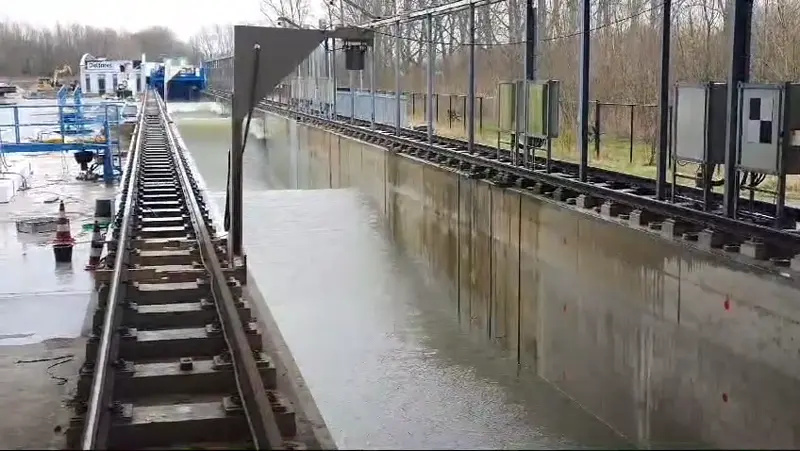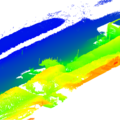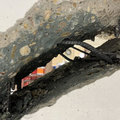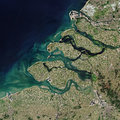Archive
11 April 2024
Mangroves that can protect coastlines worldwide

High waves startle mangroves for days during an experiment at the Delta wave flume in Delft. Researchers from Deltares and TU Delft keep increasing the force on the trees. They test how strong the mangrove trees are under extreme wave conditions and what contribution they make to water safety.
19 March 2024
Salt marshes put to test in wave flume

Can salt marshes serve as a natural solution for flood protection? Researchers of the project ‘Living Dikes’ transported 62 big blocks of salt marshes, containing soil and vegetation, from the coast of Friesland to the Delta Flume at Deltares. After four weeks of exposure to extreme waves, almost the entire salt marsh is still standing there.
22 January 2024
Students crafting flood resilience during hackathon

During the 182nd Dies Natalis of TU Delft, we delved into the theme of "Redesigning Deltas" to underline that we need rethink our approach to keep deltas around the world safe and liveable in the future. As part of the preceding Delta week, we organised a hackathon. On 9 January, students joined forces and took up the challenge: Crafting flood resilience in the Rotterdam region.
11 September 2023
successful participation of HE department at the ESREL conference 2023.

The HE department had a successful participation at the European Safety and Reliability Association conference ESREL 2023. Leslie Mooyart, Gina Torres, Miguel Mendoza, Guus Rongen, Rieke Santjer, and myself (on behalf of Patricia Mares) presented papers at the conference.
19 June 2023
Damping waves with 50,000 rubber grass blades

Dimitris Dermentzoglou, PhD student in Coastal Engineering, investigates whether salt marshes can serve as a natural solution for coastal protection. It is why he mimics salt marsh vegetation at the TU Delft Waterlab. He hopes his research will yield a more sustainable alternative to the repeated raising of dikes.
25 May 2023
Drought as the perfect storm for salt intrusion research

River water is becoming saltier and that is not good news for our drinking water. To find solutions, researchers are working hard to understand when and how salt intrusion happens. Hydraulic engineering PhD candidate Tess Wegman is fascinated by the behaviour of saltwater and freshwater flows taking place beneath the surface of the water.
06 April 2023
Coastal changes not only caused by wind and waves, but also by people

Our coast protects us from the water; it is necessary understand its dynamic processes and to retain the sand at the coast. Natural influences such as wind and waves are constantly changing the coastline. Another important process affecting the coastline is often overlooked: human activity. To investigate this, Roderik Lindenbergh of TU Delft receives a grant from the NWO's Open Technology Programme for the AdaptCoast project.
13 March 2023
Dutch bridges are stronger than assumed

Most concrete bridges on our highways have been there for more than sixty years. They tirelessly carry heavily loaded trucks. How long can we still rely on these bridges? Yuguang Yang and his colleagues made precise replicas of existing bridge parts. Last week in the lab at TU Delft, they loaded one of the replicas till collapsing: how many trucks can the bridge ultimately carry? The first impression from the tests turned out to be positive; the experiments suggest that the bridges may be stronger than initially thought. Some of bridges can hopefully last a while and do not need to be strengthened or replaced yet.
24 February 2023
16 million to keep the Dutch delta livable - even as it changes

Deltas and coastal plains are attractive places to live: fertile, flat, and open to the sea. These lowlands are, however, also vulnerable to climate change and sea-level rise. To better predict how deltas develop in the future, a thorough understanding is needed of biogeomorphology- how organisms, currents, waves, water, and sand discharge shape the delta-landscape. It was announced today that Δ-ENIGMA, a project focusing on this formation of the delta landscape, is one of the projects that will be funded from the National Roadmap for Large-Scale Research Infrastructure (LSRI) call of the Dutch Research Counsil (NWO).
21 November 2022
Refreeze the Arctic Foundation supports climate research at TU Delft

On 21 November 2022, Delft University Fund signed a multi-year grant agreement with the Refreeze the Arctic Foundation. This will enable the development of innovative methods at TU Delft to modify clouds to combat global warming.